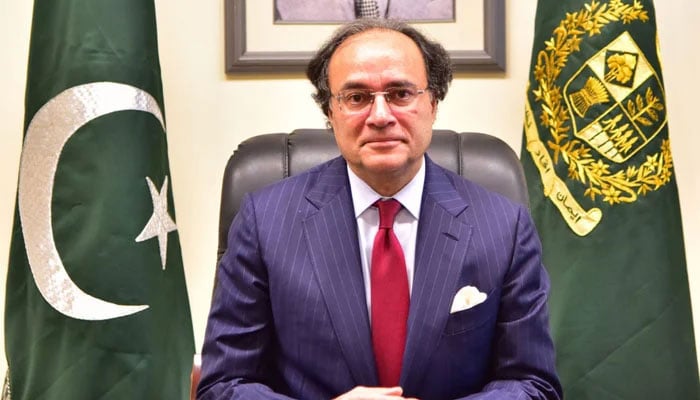Pakistan reaffirms commitment to economic reforms implementation
Minister says government is taking actions to address the issue of broadening the tax net
Finance Minister Muhammad Aurangzeb has said that the government has no alternatives but implement economic reforms as part of its agreement with the International Monetary Fund (IMF).
In his discussion with the IMF Director on Wednesday, the minister highlighted the urgency of economic reforms for the country, reiterating the government's resolve to implement them.
The finance minister's assurance comes hours after a top IMF official stressed that the country should stay on the course of reforms that were instrumental in securing crucial funding from the lender.
The minister, leading a high-level delegation met with IMF's Director of Middle East and Central Asia Department, Jihad Azour, in Washington on Tuesday. He outlined the government's efforts towards fiscal consolidation, revenue expansion, energy and SOE reforms, aimed at transitioning Pakistan from stabilisation to growth, according to a statement issued by the Ministry of Finance.
Aurangzeb is currently in Washington leading the country's delegation to the Annual Meetings of the World Bank Group and IMF, being held in Washington DC from October 21-26.
Other delegates include Finance Secretary Imdad Ullah Bosal, Secretary Economic Affairs Dr Kazim Niaz, and State Bank of Pakistan's Governor Jameel Ahmad, the ministry added.
In his discussion with IMF officials today, Aurangzeb, who is tasked with navigating the country through a challenging economic situation, pointed out that the government is taking decisive action to address the issue of broadening the tax net.
"We will bring tax evaders into the tax net," he stressed, signalling stricter enforcement of tax policies.
The minister also highlighted a shift in the country’s approach to long-term economic growth. "We want to rely on investment rather than aid," he stated, emphasising the government's intention to attract more foreign and domestic investments.
The minister also outlined the government's plans to privatise loss-making state-owned enterprises, an essential part of Pakistan’s strategy to cut down the fiscal deficit.
Aurangzeb acknowledged that the federal government's spending is also under scrutiny, saying, "We are also cutting the volume of federal government's expenditures."
Moreover, pension liability is a major challenge for Pakistan, he remarked, suggesting that reforms in the pension system are also on the horizon.
Finance minister's other engagements in Washington
Earlier today, the finance czar also met with his Saudi counterpart Mohammed Aljadaan on the sidelines of the World Bank-IMF Annual Meetings in Washington DC.
Appreciating the historical, fraternal bonds between the two countries, the two ministers resolved to further deepen mutually beneficial economic ties, enhance bilateral trade, and facilitate investments in key sectors.
The Saudi Minister shared his experience of reforms in the energy sector. The two also agreed to advance cooperation in areas of mutual interest.
Meantime, the minister held discussions with a delegation of CitiBank led by Jay Collins, Vice Chair of Public Sector and briefed them about Pakistan’s economic stabilisation and reforms being undertaken in the areas of taxation, energy, SEOs, pensions and rightsizing the government.
The minister spelled out the long-term road-to-market strategy, stressing that tapping into international capital markets would also be on the agenda of the government in due course of time.
The minister also met with Assistant Secretary for International Finance of the US Treasury Department Brent Neiman in Washington DC earlier today.
He briefed Neiman about measures to broaden the tax base, align the provincial AIT regimes with federal, personal and corporate income tax rates, rationalise subsidies, reform the energy sector, overhaul SOEs and build climate resilience through the effective implementation of the C-PIMA Action Plan and enhanced climate adaptation investments.
He also thanked the US for its support in securing the IMF’s Extended Fund Facility for Pakistan.
-
Will Warner Bros finalize deal with Paramount or stays loyal with Netflix's offer?
-
$44 billion Bitcoin blunder: Bithumb exchange apologizes for accidental payout
-
Global memory chip crunch puts spotlight on Apple; Will iPhone become more pricey?
-
Bitcoin plummets toward $60,000 as investors dump risky bets
-
Bitcoin crashes below $63K as regulatory pressure and market fears grow
-
Bitwise Crypto Industry innovators ETF: What investors should do in 2026?
-
Nintendo shares slide again as momentum fears grow
-
Gold, silver prices fallen sharply; What’s driving the drop?












